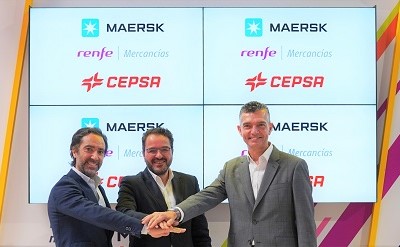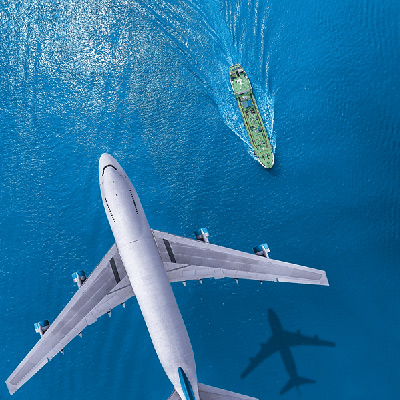The goal is to turn the Madrid-Algeciras rail corridor into a decarbonized route
- For three months, the companies will test renewable diesel as a solution for the freight train transport of a Maersk customer's shipments, covering five weekly round trips on the Algeciras-Cordoba segment of the Algeciras-Madrid route, which is not fully electrified
- This renewable diesel, produced from used cooking oils, will be supplied to Renfe Mercancías locomotives and will allow them to travel almost 40,000 kilometers and avoid the emission of more than 600 tons of greenhouse gases
- The implementation of this pilot test will make it possible to extract technical, environmental and economic data to analyze the feasibility of using green fuels as an alternative to conventional diesel in rail transport on non-electrified lines
- Second-generation biofuels, produced by Cepsa at its energy park in Palos de la Frontera (Huelva), promote the circular economy and reduce CO2 emissions by up to 90%
- Representatives of the three companies presented the project at SIL Barcelona, the main logistics and transport trade fair in southern Europe
The project will begin in early July and will last for three months. Cepsa will supply 160 tons of second-generation biofuel, produced at its La Rábida Energy Park (Huelva) from used cooking oils to cover a total of five weekly round trips. Renewable diesel will replace conventional diesel in the Renfe locomotives that Maersk uses to transport its customers' goods from Algeciras to Cordoba. In Cordoba, they will continue the route to Madrid on electric trains powered by renewable energy.
This renewable diesel will cover almost 40,000 kilometers and avoid the emission of more than 600 tons of greenhouse gases.
The implementation of this pilot test will make it possible to extract technical, environmental and economic data to analyze the feasibility of using green fuels as an alternative to conventional diesel in rail transport on non-electrified lines, with the aim of offering this solution to other Maersk customers.
The three companies are participating this week at SIL Barcelona, the Leading Exhibition for Logistics, Transport, Intralogistics and Supply Chain Fair in Southern Europe, which this week is bringing together representatives of more than 650 companies at the Fira Conference Center. As part of the forum, managers from Maersk, Renfe and Cepsa presented this pioneering project in rail transport, whose objective is to make the Algeciras-Madrid rail corridor a sustainable route.
Emilio de la Cruz, managing director of Maersk's Southwest Europe and Maghreb Area, said: “Looking at the actual effects of climate change in many countries, the importance of decarbonizing logistics cannot be understated. Maersk is considering decarbonized transport solutions not only as a crucial differentiator for our customers, but also as a commitment to society. This is why we are working hard to develop solutions with very low GHG emission across all areas: in our ocean vessels, for hinterland transport as well as in warehousing and distribution. Our ambition at Maersk is to be net-zero across our entire business by 2040 and we have ambitious short-term goals in place for 2030. Every step counts. Hence, this innovative rail project in Spain marks a very important milestone in a much bigger plan for achieving our net-zero target.”
Joaquín del Moral, general manager of Renfe Mercancías, said: "As the process of electrification of the rail network progresses, it is key for Renfe Mercancías to explore possible alternatives to the use of fossil fuels in trains running on non-electrified lines, which currently represent approximately 35% of Spanish railways. In this way, we will not only contribute to the overall goal of reducing emissions in the transportation sector, but also give our diesel locomotives a second life, thanks to the development of new green fuels.”
Carlos Giner, Chief Commercial Officer of Cepsa's Commercial & Clean Energies, highlighted: "At Cepsa, we want to be a driver of change and promote sustainability and decarbonization for our customers in all types of transport: rail, sea, air and road. This agreement with leading companies such as Maersk and Renfe expands our collaborative ecosystem by bringing together synergies to drive the energy transition and the fight against climate change."
Second-generation biofuels can be used in locomotives without engine modifications and offer a significant reduction in greenhouse gas emissions compared to conventional fuels. Specifically, during the entire life cycle, from production to use, these emissions can be reduced by up to 90% compared to traditional fuels. In addition, these biofuels promote the circular economy by using waste for their production that would otherwise be discarded or end up in landfills.
Commitment to sustainability
After carrying out various tests in air and maritime transport, this agreement represents a new step forward for Cepsa in its objective of facilitating the decarbonization of heavy transport through the production of green molecules. As established in its Positive Motion strategy, the company aims to become a benchmark in the energy transition and lead biofuel production in Spain and Portugal by 2030, with an annual production of 2.5 million tons.
Maersk has announced that it will be net-zero by 2040 across all business areas, including ocean, hinterland and air transport as well as landside activities such as warehousing, terminals and other land-based services. To achieve this Maersk has defined ambitious short-term goals for 2030, including a 90% reduction of GHG emissions (versus baseline year 2020) from its landside logistics activities such as rail.
Renfe Mercancías, a leading operator in sustainable mobility, continues to reinforce its corporate strategy in a clear commitment to lead the decarbonization of transport. During the past year, almost 80% of the company's total traffic was carried by "CeroCO2" electric locomotives powered by renewable energy, a proportion that is being increased thanks to the acquisition of new, more modern, safer and more efficient electric traction equipment. In this line, Renfe Mercancías has put into service this year 12 new high-power electric locomotives to operate on Iberian gauge and awarded last March the contract for the supply of another 12 international gauge electric locomotives for 136.7 million euros with an option to supply an additional 6 locomotives for freight traffic on the Mediterranean Corridor and to operate in France. The implementation of this biofuel trial will make it possible to explore sustainable alternatives for rail transport on non-electrified lines.




